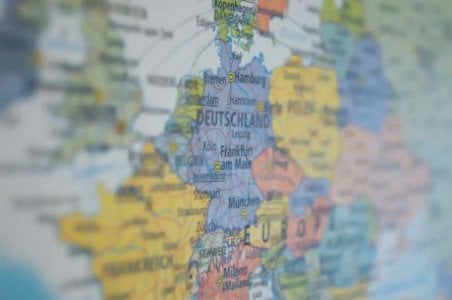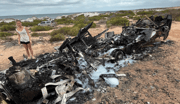Is this continent preparing for a massive conflict? Countries reveal contingency plans for looming threat
By
Danielle F.
- Replies 60
As the world watches the geopolitical landscape with bated breath, one continent is taking no chances when it comes to the possibility of a large-scale conflict.
With tensions rising and the spectre of war looming, European nations are actively preparing for the worst-case scenario possible.
The continent has been preparing extensively as the threat of World War Three looms around.
These preparations ranged from survival guides, mass evacuations, construction of massive bunkers and the implementation of conscription.
The driving force behind these preparations was the fear of a Russian invasion, particularly as Europe observes the ongoing situation in Ukraine.
The European Union has been concerned that Russia could potentially launch an attack if its ambitions in Ukraine are realised by 2030.

This prediction led the Commission to warn that the bloc must be ready for a large-scale war.
Countries across Europe are not just bolstering their military capabilities; they are also preparing their citizens for the grim realities of war.
The United Kingdom, while a separate entity from the European Union, received calls to join other European nations in conscripting citizens into their growing armies.
Civilians are also being educated on what to do in life-threatening events in their area.
France has taken a proactive approach by planning as it issued a 20-page survival guide to its citizens.
This booklet could provide advice on how to defend the republic in the face of an invasion, including signing up for reserve units or local defence efforts.
It could also offer practical tips on assembling a survival kit with essentials such as water, canned food, batteries, and medical supplies.
French President Emmanuel Macron also revealed that French fighter jets, equipped with a new generation of hypersonic nuclear missiles, are now stationed along the border with Germany.
This move suggested a mutual defence agreement where France would use nuclear weapons to defend Germany if it were attacked, as France would consider itself threatened.
Poland sought similar nuclear protection from France or the United States.
The country is also planning to implement conscription for all men.
The Baltic and Nordic countries, acutely aware of the Russian threat, have some form of conscription already in place.
Norway, a country sharing a border with Russia in the Arctic, has been preparing for mass evacuation drills for citizens living in northern towns.
Norwegians located outside northern towns were also urged to know how to manage on their own in the event of war.
The drills were part of a North Atlantic Treaty Organisation (NATO) exercise, and civilians should be trained to flee westward or south into Finland.
Swedish households have received pamphlets titled If Crisis or War Comes, while Finland advised its citizens to prepare for incidents and crises.
Meanwhile, Denmark has issued warnings detailing the essentials needed to survive three days of crisis.
In a significant shift, Sweden and Finland abandoned their historical neutrality and joined NATO after witnessing the conflict in Ukraine.
Germany's preparation plans, known as Operation Deutschland, included a 1000-page document outlining the protection of specific buildings and infrastructure.
The government has also identified bunkers that could shelter civilians and is prepared to mobilise vehicles and NATO troops.
The Baltics are constructing a joint defence line on their border with Russia, featuring bunkers, tank ditches, and defensive obstacles.
Poland and the Baltics have even withdrawn from an international treaty banning anti-personnel landmines as they prepare their defences against a possible Russian advance.
The European Union initiated a colossal spending plan to rebuild its armies and support Ukraine, with up to 800 billion Euros earmarked for defence.
Plans are also underway to build a drone shield stretching from the Baltic to the Black Sea.
These drone shields aim to deter a Russian invasion and make the prospect too costly for Putin to consider.
These preparations could be a sobering reminder of the fragility of peace and the importance of readiness.
Seniors may remember the lessons of history and the value of preparedness.
It's crucial to stay informed and aware of the measures being taken to safeguard our nations and our way of life.

We invite our readers to share their thoughts and experiences. How do you feel about these preparations? Do you remember similar measures from the past? Engage with us in the comments below, and let's discuss the importance of being prepared for uncertain times.
With tensions rising and the spectre of war looming, European nations are actively preparing for the worst-case scenario possible.
The continent has been preparing extensively as the threat of World War Three looms around.
These preparations ranged from survival guides, mass evacuations, construction of massive bunkers and the implementation of conscription.
The driving force behind these preparations was the fear of a Russian invasion, particularly as Europe observes the ongoing situation in Ukraine.
The European Union has been concerned that Russia could potentially launch an attack if its ambitions in Ukraine are realised by 2030.

Many spectators are looking at Europe as conflict continues to raze some parts of the continent. Image Credit: Pexels/Pixabay
This prediction led the Commission to warn that the bloc must be ready for a large-scale war.
Countries across Europe are not just bolstering their military capabilities; they are also preparing their citizens for the grim realities of war.
The United Kingdom, while a separate entity from the European Union, received calls to join other European nations in conscripting citizens into their growing armies.
Civilians are also being educated on what to do in life-threatening events in their area.
France has taken a proactive approach by planning as it issued a 20-page survival guide to its citizens.
This booklet could provide advice on how to defend the republic in the face of an invasion, including signing up for reserve units or local defence efforts.
It could also offer practical tips on assembling a survival kit with essentials such as water, canned food, batteries, and medical supplies.
French President Emmanuel Macron also revealed that French fighter jets, equipped with a new generation of hypersonic nuclear missiles, are now stationed along the border with Germany.
This move suggested a mutual defence agreement where France would use nuclear weapons to defend Germany if it were attacked, as France would consider itself threatened.
Poland sought similar nuclear protection from France or the United States.
The country is also planning to implement conscription for all men.
The Baltic and Nordic countries, acutely aware of the Russian threat, have some form of conscription already in place.
Norway, a country sharing a border with Russia in the Arctic, has been preparing for mass evacuation drills for citizens living in northern towns.
Norwegians located outside northern towns were also urged to know how to manage on their own in the event of war.
The drills were part of a North Atlantic Treaty Organisation (NATO) exercise, and civilians should be trained to flee westward or south into Finland.
Swedish households have received pamphlets titled If Crisis or War Comes, while Finland advised its citizens to prepare for incidents and crises.
Meanwhile, Denmark has issued warnings detailing the essentials needed to survive three days of crisis.
In a significant shift, Sweden and Finland abandoned their historical neutrality and joined NATO after witnessing the conflict in Ukraine.
Germany's preparation plans, known as Operation Deutschland, included a 1000-page document outlining the protection of specific buildings and infrastructure.
The government has also identified bunkers that could shelter civilians and is prepared to mobilise vehicles and NATO troops.
The Baltics are constructing a joint defence line on their border with Russia, featuring bunkers, tank ditches, and defensive obstacles.
Poland and the Baltics have even withdrawn from an international treaty banning anti-personnel landmines as they prepare their defences against a possible Russian advance.
The European Union initiated a colossal spending plan to rebuild its armies and support Ukraine, with up to 800 billion Euros earmarked for defence.
Plans are also underway to build a drone shield stretching from the Baltic to the Black Sea.
These drone shields aim to deter a Russian invasion and make the prospect too costly for Putin to consider.
These preparations could be a sobering reminder of the fragility of peace and the importance of readiness.
Seniors may remember the lessons of history and the value of preparedness.
It's crucial to stay informed and aware of the measures being taken to safeguard our nations and our way of life.
Key Takeaways
- Europe has been taking proactive measures in preparation for a potential conflict amid fears of a Russian invasion.
- Several countries are preparing their citizens for military engagement and self-defence.
- European nations, particularly the Baltics and Nordic countries, are acutely aware of the threat from Russia and are making preparations for mass evacuations and military defence.
- The European Union has invested heavily in defence, with plans to spend up to 800 billion Euros.







